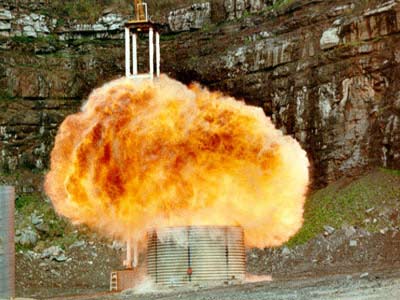New generation explosives: Stronger, safer
German scientists have successfully developed a new generation of explosives, stronger than 'traditional' explosives , less prone to sudden explosions, and produce less toxic gas.

German scientists have built new, stronger and more environmentally friendly explosives (Photo: CDC)
In this new study of environmentally friendly explosives, scientists Thomas M. Klapötke and Carles Mir Sabate said that 'traditional' explosives widely used in military, such as TNT, RDX and HMX, contain a lot of carbon and produce many toxic gases when detonated.
'Traditional' explosives not only pollute the environment, but also are highly sensitive to physical impacts, such as strong collisions and electric sparks, so it is extremely dangerous to use. According to the team, new generation explosives must be 'greener' and safer.
To meet that requirement, Klapötke and Sabate used a new material called tetrazoles that most of its explosive energy originated from nitrogen instead of carbon. They identified two promising types of tetrazoles and from these two materials, the team created tiny bombs and detonated them in the laboratory.
Test results show that compared to conventional explosives, this new type of explosive is less sensitive to shock and emits less toxic gas when exploded.
This study will be published in the Journal of Materials Chemistry of the American Chemical Society on June 24.
- New compound is 1.5 times stronger than TNT
- The 5 most powerful non-nuclear explosives in the world
- Find out how to make super-strong explosives at relatively low pressures
- The great sacrifice behind the invention of the world's most destructive weapon
- Detects explosives at long distances through obstructions
- Successfully manufactured a new explosion detector
- Use bee venom to detect explosives
- Application of genetically modified plants looking for explosives
- The plant species detects explosives
- Development of explosive detection equipment to replace professional dogs
- The new generation Wi-Fi standard has been postponed to 2008
- Surprised species of plants detect explosives
 Is the magnetic North Pole shift dangerous to humanity?
Is the magnetic North Pole shift dangerous to humanity? Washington legalizes the recycling of human bodies into fertilizer
Washington legalizes the recycling of human bodies into fertilizer Lightning stone - the mysterious guest
Lightning stone - the mysterious guest Stunned by the mysterious sunset, strange appearance
Stunned by the mysterious sunset, strange appearance